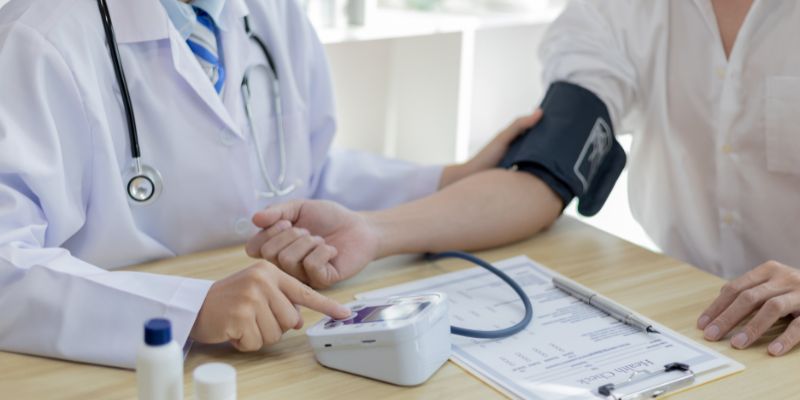
High blood pressure, generally known as hypertension, is a medical condition. Hypertension is typically measured in millimeters of mercury. High blood pressure is expressed in two numbers: diastolic pressure and systolic pressure.
Normal blood pressure in humans is 120/80 mm Hg; any number above this figure is typically hypertension. Blood pressure is a serious medical problem, affecting over 600 million people worldwide.
Blood pressure is often called a silent killer because it will destroy your health silently without giving any hint of its presence. However, today, we are here to shed some light on this issue; we will mention the signs and symptoms of high blood pressure.
Here, we will unravel the subtle signs and symptoms of high blood pressure that might help you in any way. Let's discuss the signs and symptoms of high blood pressure and decode this mystery.

What Are The Top Symptoms Of High Blood Pressure?
You might be curious about high blood pressure's top signs and symptoms. Blood pressure or hypertension often goes unnoticed because it rarely shows symptoms or signs.
However, being aware of the signs and symptoms of high blood pressure is crucial, as untreated hypertension could cause serious illnesses and consequential health problems. Here are some potential signs and symptoms of high blood pressure.
Headaches
Let's begin with the most common one: a sore head is the ubiquitous sign of hypertension. People with high blood pressure are most likely to experience headaches, particularly when their blood pressure is extremely high.
Headache is a common sign of hypertension; however, not everyone experiences headaches, and many other factors can cause sore heads. Most of the studies show that hypertension and headache are not associated.
Trouble In Vision
Vastly high blood pressure can cause hypertensive retinopathy. It damages the blood vessels in the eyes. In hypertensive retinopathy, high blood pressure damages the blood vessels in the retina and causes various vision problems, including blurred vision. Blurry vision is a potential sign of extremely high blood pressure.
Fatigue
Being tired can always be a sign of high blood pressure; persistent fatigue is a symptom of hypertension. This condition happens because the heart has to exert extra effort to pump blood throughout the body when blood pressure is extremely high.
Fatigue can be associated with high blood pressure, but not in all cases; sometimes, it happens due to other factors like stress, anxiety, and other health issues that can lead to feelings of tiredness.
Shortness Of Breath
According to the reports, high blood pressure can lead to many life-threatening problems, and shortness of breath is one of them. It is reported that shortness of breath is a potential sign of high blood pressure.
People often face this problem while involved in physical activity or lying flat. However, it is crucial to recognize that shortness of breath is sometimes associated with hypertension, but it is not a universal symptom of high blood pressure.
Frequent Nose Bleeding
Nose bleeding is not a common sign of high blood pressure; some people experience nose bleeding due to high blood pressure. It happens when the blood pressure of the body is extremely elevated. Therefore, when experiencing nose bleeding, it is advisable to consider multiple possible causes and consult a healthcare professional for a thorough evaluation.
Irregular Heartbeat
High blood pressure affects the human heart in many ways. Irregular heartbeat is among the serious potential issues associated with hypertension. Hypertension can lead the heart to beat in an irregular rhythm.
Risk Factors of High Blood Pressure
The report says high blood pressure leads to many life-threatening serious issues and health problems like heart disease, stroke, kidney disease, and more. So, knowing the risk factors and symptoms of hypertension can help you to understand and treat the condition in a better way:
Age
It is reported that the risk of high blood pressure increases with age. A 2020 survey performed in Spain revealed that approximately 55 percent of the elderly population aged between 75 and 84 were affected by hypertension. This study shows that age is a big factor in high blood pressure. However, high blood pressure can affect individuals of every age, but its prevalence increases noticeably in old age.
Stress
Stress can lead to hypertension in any individual. High-stress levels can contribute to high blood pressure but temporarily increase. When an individual encounters a stressful situation, the human body releases stress hormones. The hormones increase the heartbeat rate, and the blood vessels start constricting, leading to high blood pressure, but temporarily.
Obesity and Overweight
Obesity and being overweight are significant risks for developing high blood pressure. An individual with over body weight is at heightened risk of experiencing high blood pressure. The excess fats in the body can lead to several health problems like an increase in blood volume, kidney problems, and many others; all these problems cause high blood pressure.
How To Reduce High Blood Pressure?
Reducing high blood pressure is not difficult; anyone can indeed lower body blood pressure. Lowering blood pressure involves a combination of lifestyle changes. You can also seek help from a trusted medication center. Here are some effective strategies to reduce high blood pressure and bring it to the healthy range.
Diet Change:
The dietary change will significantly affect the reduction process. You can switch your diet with a DASH diet, which includes many healthy foods.
Regular Exercise:
Actively exercising will help you reduce hypertension. Physical activity is important for hypertension patients, so exercise is involved in your routine.
Medication:
In some cases, changing lifestyle is not enough. Seek help from the doctor and follow their medication instructions to reduce high blood pressure and defeat this silent killer.
Conclusion
High blood pressure is affecting millions of people around the globe. It is also referred to as the "silent killer," it stealthily rises in the body without any noticeable warning signs. However, our journey through this article has mentioned the subtle signs and symptoms of high blood pressure, providing a guide to understanding what our bodies might be trying to indicate, along with some effective strategies to reduce high blood pressure.




